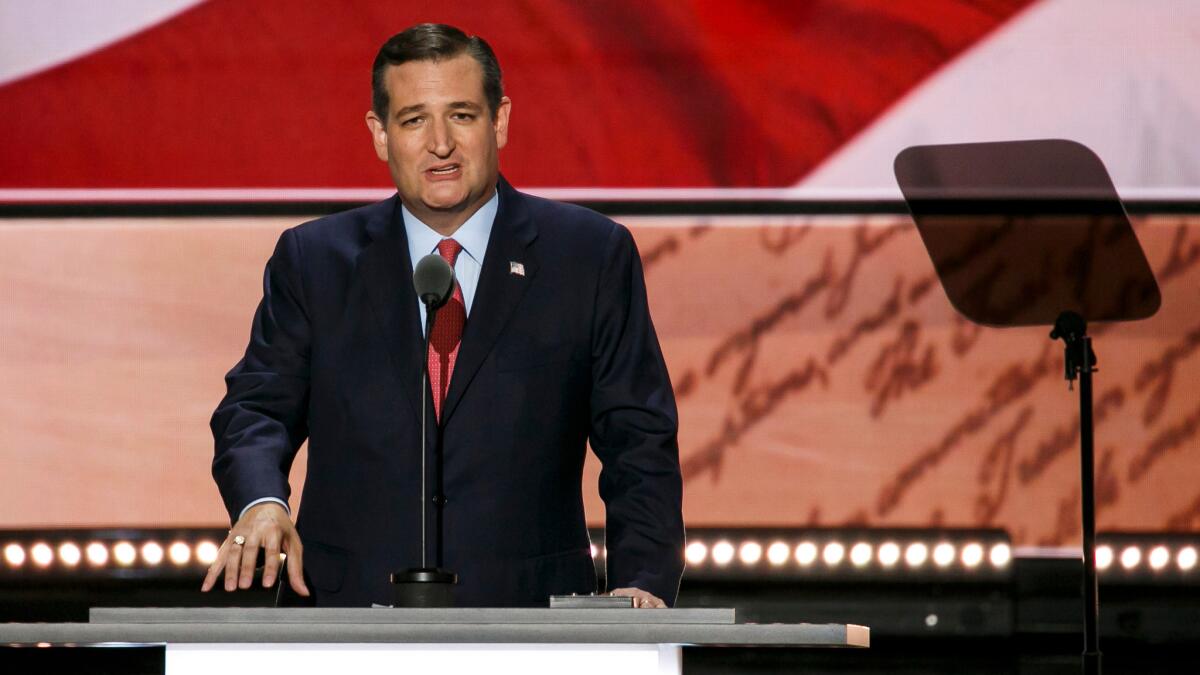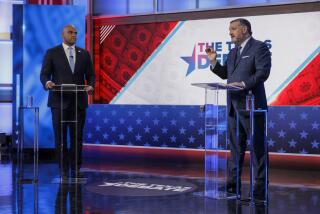Ted Cruz leads the parade of politicians at the Republican convention who are looking ahead to 2020

- Share via
Reporting from Cleveland — The balloons and confetti had not yet dropped on Donald Trump, and already the race to replace him as the 2020 GOP nominee was well underway Thursday.
All week, ambitious Republicans with their eyes focused four years ahead had circulated quietly among delegations from key states, shaking hands, making contacts and subtly touting their qualifications. But Sen. Ted Cruz’s remarkable refusal to endorse the top of the ticket during his speech at the GOP convention brought the contest into public view.
Cruz has not formally announced that he will make another run for the White House. But it hardly mattered.
The morning after he was booed off the Republican convention stage by angry Trump supporters, the Texas senator tried to position himself as the top Republican willing to buck Trump and as a conservative torch-bearer determined to put principle before party.
“I wasn’t elected to do the convenient thing, I was elected to stand up and do what’s right,” Cruz said during a rowdy breakfast exchange with delegates from his home state.
With that, the 2020 campaign was all but off and running.
Convention week always provides a venue for future presidential hopefuls to introduce themselves to the party faithful and big-money donors. In 2004 at the Republican National Convention in New York, then-Massachusetts Gov. Mitt Romney threw a party for delegates from early primary states on the retired aircraft carrier Intrepid. Eight years later, he was the nominee.
This time, at least half a dozen prominent Republicans followed a similar plan even as other potential candidates, including Sens. Marco Rubio of Florida and Ben Sasse of Nebraska, stayed away.
John Kasich, the popular Ohio governor, waged what at times resembled a shadow convention with a packed schedule of daily events — none of which were held near the Quicken Loans Arena stage where the official convention took place.
Kasich greeted New Hampshire delegates, was feted at a party at the Rock and Roll Hall of Fame and spoke about policy at events with the International Republican Institute and the U.S. Hispanic Chamber of Commerce.
Romney’s 2012 running mate, House Speaker Paul D. Ryan of Wisconsin, had little choice but to share the spotlight with Trump, announcing the roll call vote that handed the businessman the nomination. But Ryan also found time for several other events that showcased his claim to be the candidate of new ideas.
Veteran campaign-trail warriors Rick Santorum, Mike Huckabee and Newt Gingrich made the rounds — Gingrich on a boat tour with supporters.
“If you’re looking for the perfect candidate, go home, read your Bible and practice your faith and wait for the second coming,” Santorum told Iowans. “Because it isn’t going to happen until then.”
Other up-and-comers, including South Carolina Gov. Nikki Haley, Iowa Sen. Joni Ernst and Arkansas Sen. Tom Cotton, let it be known they were in town. Cotton kept up one of the busiest schedules of breakfasts, including a 60-mile trek to Sandusky to meet with the California delegation, which otherwise got few prominent visitors.
Asked directly if he was considering running, Cotton laughed: “No. Right now I’m thinking about making sure Republicans win across the country.”
But nowhere was the next Republican contest more on display than with Cruz.
For those who have watched Cruz’s career, his refusal to fall in line as other Republicans reluctantly rallied around Trump came as no surprise.
The first-term senator is one of the most combative lawmakers on Capitol Hill. He singularly led the GOP into the unpopular 16-day federal government shutdown shortly after he took office in 2013. He said he told Trump he would not be endorsing him when he was first invited to share the stage in Cleveland and in a phone call before the speech.
“Some people will say it’s a totally disruptive act, and the anti-Trump people will say it’s an effort to save the party,” said Jack Pitney, a professor of American politics at Claremont McKenna College and a former Republican aide in Washington.
“The one thing that is certain: Ted Cruz is not afraid to make people angry. That’s the rock-solid conclusion. He doesn’t care.”
Cruz didn’t close the door on an eventual endorsement of Trump, but after their bitter primary campaign, during which Trump attacked his rival’s wife and father, Cruz made it clear the GOP nominee had not earned his vote.
“I am watching, and I’m listening,” Cruz said at the Texas delegation breakfast. Pushed by his fellow Texans to use his position to unify the party around Trump, Cruz shot back that the GOP is not a “social club” and must hold true to its values.
“We either stand for shared principles or we’re not worth anything,” he shouted.
“You got to get over it!” hollered one Texan. “This is politics!”
“This is not a game!” Cruz shot back. “It’s not politics. Right and wrong matter.”
“If anyone thinks I was eager to come to this convention and give a speech, supporting a great many policy positions laid out by the nominee, laying out why Hillary Clinton is utterly unfit — despite the fact that neither he nor his campaign took back a word about my family — I was not eager to do this,” Cruz said.
“I don’t intend to throw rocks,” said Cruz, who fielded questions during a spirited session punctuated by boos and cheers. “I am not encouraging anybody to write my name in.”
The risks for Cruz are clear. While his stand sets him apart from a GOP establishment that has reluctantly rallied around Trump, his refusal to endorse threatens to prolong the party disunity that has been on vivid display here.
The expansive Texas delegation — many in cowboy hats and trademark Lone Star State dress shirts — split deeply over their once-favorite son. Some welcomed his stand as principled, but many were disappointed by his refusal to help unite the fractured GOP.
“He just eroded his base,” said Gina Castenada, a delegate from Houston, who voted for Cruz during the primary, but wants him to back Trump. “The support will not be there in the next election.”
“I’m proud of him,” said Grant Moody, a Marine who served in Iraq and Afghanistan and is now a banking executive in San Antonio.
“I’m still waiting, as I think Sen. Cruz, and many conservatives are waiting, for Donald Trump to behave in a manner befitting of the office — to tone down his demeanor.”
“It’s not some political calculation to set him apart,” Moody said. “He’s speaking his heart.”
Twitter: @LisaMascaro
ALSO
The revolution may be delayed: A reporter’s diary from outside the GOP convention
More to Read
Get the L.A. Times Politics newsletter
Deeply reported insights into legislation, politics and policy from Sacramento, Washington and beyond. In your inbox three times per week.
You may occasionally receive promotional content from the Los Angeles Times.












